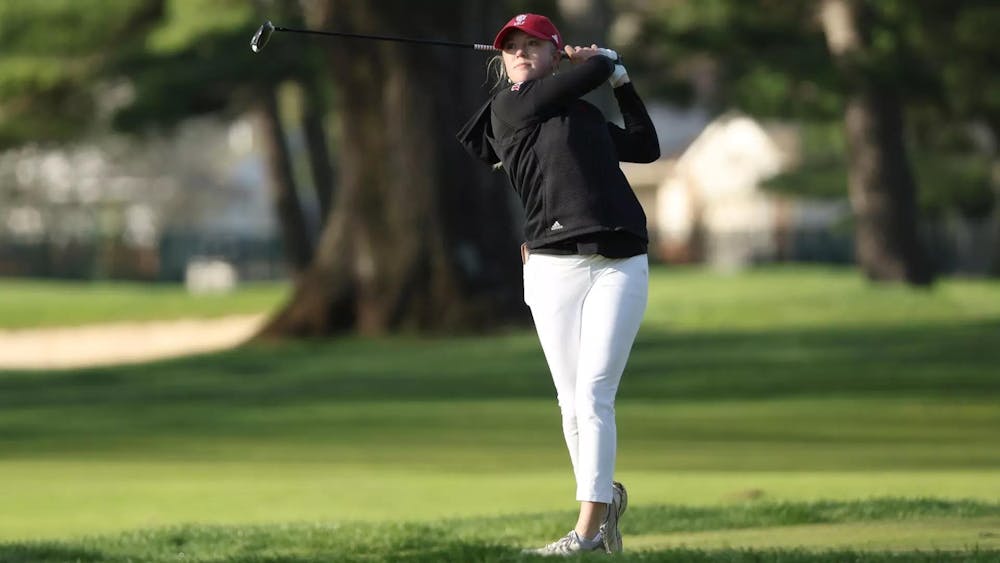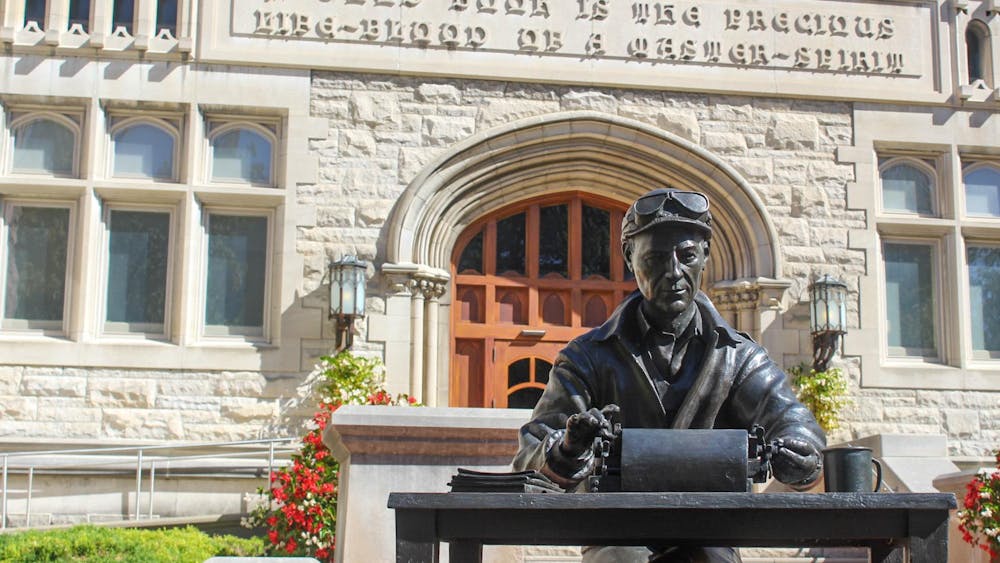“I speak my words unto God, O Gaza,” she said, reciting the words of poet Manal Miqdad . The poem is one he wrote after a sleepless night of violence in the Gaza Strip, a Palestinian region, and has been translated from Arabic.
Nabulsi spoke clearly and slowly: “Creator of the world, are you receiving my letters? ... Why won’t you believe me when I lay down my plea before you: I do not want war, I do not want my life to end.”
Two students stepped into the circle and relinquished their lights, setting the single-wick tea lights in the center of the circle .
Surrounding the flames were Palestinian and Israeli students alike, standing shoulder-to-shoulder and listening to the stories of violence.
The candlelight vigil, hosted by J Street at IU, brought a group of students to Showalter Fountain on Monday night to reflect upon the lives lost in the Palestinian-Israeli conflict, particularly in the bursts of violence this summer.
Nabulsi had been there.
She was in Jerusalem, though, out of harm’s way, before she left.
“I am full-blooded Palestinian, and what happened this summer not only greatly affected my family, but also my people,” she said.
In one hand, she still held the copy of the poem she had read, folded neatly in three sections.
“People don’t understand (why I’m so passionate) about this,” she said. “But it’s who I am. Without it, I’m nothing.”
The vigil was organized by several IU students involved in J Street at IU. J Street, a national organization, “advocates for a peaceful, just two-state solution for Israel and the future state of Palestine,” according to its Facebook page.
Joshua Friedman , a junior who spearheaded the beginnings of J Street at IU, became especially involved in the Israeli-Palestinian conflict after spending a year in Israel following high school.
As an American Jew, he noted that the lack of education on the issue in the States confounds him. In Israel, working with both Arab and Jewish children, he was able to feel the dissonance between cultures.
There, he said, it was personal. Here, on campus, he relates to the situation in a more political sense.
“I’m pretty engaged with Israeli politics and over the summer I was pretty frustrated with the political climate,” he said. “Coming back, I wanted to take action. I wanted to create an actual, meaningful dialogue on campus about (the ?conflict).”
Standing on the flagstones at the foot of Showalter Fountain, Nabulsi and others listened as J Street member Lindsey Taussig read aloud the names of several young children who were killed in the summer’s violence.
“They were alive last year, now they are dead,” she read aloud. “And we are ?responsible.”
There is a sudden influx of candles being set in the center of the circle.
Several others, including Friedman, read aloud stories of true accounts of the crisis. Listening, some students continued to grip their candles, not quite ready to let go.
One looks down, his head bent and his eyes closed. When the speeches finish, his friend puts an arm around him and rubs his back.
When Friedman was in Israel, he said he couldn’t believe the sheer size of the walls between major cities, dividing their citizens. He once visited a holy site that was surrounded by the thick barriers.
“It’s crazy because it’s supposed to be (a space that is) really spiritual, really religious,” he said. “But surrounding it are walls. How could someone be here and feel spiritual at all?”
The crisis between peoples, he explained, has been ongoing for more than 30 years. It’s complex, and it isn’t one-sided, he said.
He wanted to host a vigil because, although the politics of the situation are important, this wasn’t about the conflict itself. He called the event “a call to ?empathy.”
“The point of having a vigil isn’t to talk about the political situation,” he said. “It’s to look at the very real human cost of an ongoing conflict.”
J Street’s idea to have a vigil, Friedman said, came from the surge of similar events across the country. That doesn’t mean, though, that it’s a trend they want to continue.
Before the candles are lit at the beginning of the meeting, there is a moment of stillness, and attendees listen quietly to the opening remarks. There needs to be an end to this, one of the leaders of the event, Rafi Friedman, said.
“We remain frustrated. The current status quo is untenable,” he said. “That’s why we are standing together and saying, ‘This is the last vigil.’”





